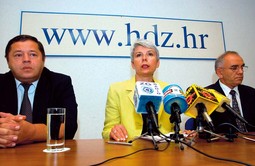Published in Nacional number 757, 2010-05-18
LETTER FROM THE EU REVEALS INCOMPETENCE
Croatia used only half the money available in pre-accession funds
 PREMIER JADRANKA KOSOR AND AGRICULTURE MINISTER PETAR COBANKOVIC WILL HAVE TO SUBSTANTIALLY IMPROVE THE EFFICACY OF STATE INSTITUTIONS SO AS TO USE AS MUCH MONEY AVAILABLE IN THE EU FUNDS AS POSSIBLENacional is in possession of a letter of 31 March 2010 in which the European Commission warns the Croatian government over the poor and inefficient use of money from the EU SAPARD and IPARD funds. The warning letter was signed by Jean-Luc Demarty, director of the Department for Agriculture and Rural Development in the EU. The two page letter stresses his concern over the inefficacy of the government, with warnings that with its failures to date, Croatia has irreparably lost a significant amount of money secured through various European funds.
PREMIER JADRANKA KOSOR AND AGRICULTURE MINISTER PETAR COBANKOVIC WILL HAVE TO SUBSTANTIALLY IMPROVE THE EFFICACY OF STATE INSTITUTIONS SO AS TO USE AS MUCH MONEY AVAILABLE IN THE EU FUNDS AS POSSIBLENacional is in possession of a letter of 31 March 2010 in which the European Commission warns the Croatian government over the poor and inefficient use of money from the EU SAPARD and IPARD funds. The warning letter was signed by Jean-Luc Demarty, director of the Department for Agriculture and Rural Development in the EU. The two page letter stresses his concern over the inefficacy of the government, with warnings that with its failures to date, Croatia has irreparably lost a significant amount of money secured through various European funds.
Demarty warned that by the end of February, the Republic of Croatia had organised only 37 projects financed from SAPARD, adding that there is an obvious need for greater efforts in the realisation of projects financed by the European Union. The letter also expresses concern over the slow progress in extracting funds from the IPARD programme, adding that due to its inertness, Croatia could lose massive funds intended for it in European funds. One of the problems is that only a very small part of the Croatian state administration is familiar with the EU programmes intended to finance candidate countries, two of the most important of which are IPARD and SAPARD.
IPARD is a pre-accession programme for the period 2007-2013 through which the EU finances agriculture and rural development, as the fifth component of the IPA programme (Instruments of Pre-accession Assistance). For example, Croatia will be allocated HRK 1.3 billion from IPARD in 2011, however the warning letter poses the question about how much of that total amount will actually be received, and how much will remain unused. SAPARD is also a pre-accession programme intended for agriculture and rural development, and its primary beneficiaries are the agriculture economy and local government units. As a rule, SAPARD projects are financed with about half from the farmers themselves and the other half comes from the EU. The entire process is strictly controlled.
This is the reason why Croatia used only HRK 93 million from this fund in 2009, just over 50% of the allocated funds, while HRK 90 million was unused. A similar situation has continued into 2010. Had the Croatian government succeeded in training the state administration in EU cooperation, about EUR 150 million would be extracted from SAPARD alone. However, due to the poor organisation, only half of this will actually be transferred.
SAPARD's financial potential can exceptionally improve the living conditions in smaller towns, as they are primarily used to finance construction and renewal of mini heating plants, roads and sewages systems in towns with approximately 10,000 residents. Those well informed in the development of negotiations with the European Union warn that Zagreb is to blame for the poor use of these funds, not Brussels. Just how disorganised the state administration is seen in the fact the government recently appointed a women who does not speak English as director as one of the agencies dealing in cooperation with EU funds. She was sent to an accelerated course in this language that is the primary means of communication within the EU.
Or take the example of the City of Karlovac which, at the recommendation of the HDZ government, received money to renew its city sewage system seven years ago, but no works have since taken place. For the sake of comparison, in this same period, Latvia renewed sewage systems in ten cities thanks to the same EU funds. Unless the Croatian government quickly develops project to be financed using EU funds, there is the danger that Croatia will face financial losses in the coming years due to its accession into the EU. The European Union has secured a total of EUR 3.5 billion for Croatia until 2012, but analyses show that due to the slow and poorly organised administration, Croatia will only pull out about EUR 500 million in 2011, and pay EUR 600 million as a future member in the union budget. Another problem is the unresolved corruption scandals, for which the EU is beginning to sanction its new members.
Related articles
Barisic could bankrupt HDZ
Chief State Attorney Mladen Bajic could strike a massive blow against the ruling HDZ party with a single signature, and put the party into… Više
Latest news
-
28.10.2010. / 14:15
'A profitable INA is in everyone's interest'
-
28.10.2010. / 09:38
Sanader’s eight fear SDP — Won’t bring down Government
-
21.10.2010. / 15:02
Interior Ministry turned a blind eye on Pukanic assassination
-
20.10.2010. / 09:34
Barisic could bankrupt HDZ




